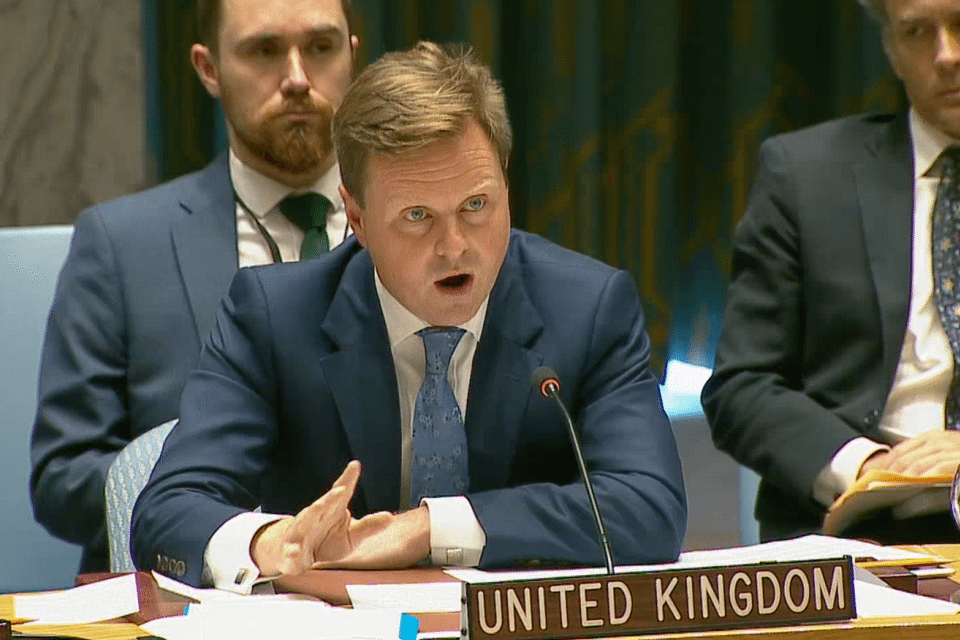Calls to Russia and the Syrian regime to improve the humanitarian situation in Syria
Statement by Stephen Hickey, UK Chargé d’Affaires at the UN, at the Security Council Briefing on the humanitarian situation in Syria.

Thank you Mr President and thank you to Under-Secretary-General Lowcock for your very detailed briefing. I would also like to thank Special Representative Gamba for your briefing. It was particularly useful to be reminded of the horrific suffering of Syrian children throughout this conflict. We should all remember that one of the sparks that lit the flame of this conflict was the arrest and detention by Syrian mukhabarats of school children from Dar’a simply for posting anti-regime graffiti on a school wall.
We should all remember the horrific recruitment and enslavement of children by Da’esh. And we should all remember the appallingly high number of children killed and maimed by indiscriminate aerial bombardment, whether it was of Aleppo or of Eastern Ghouta or areas by the Syrian regime and its allies. I was particularly struck by your conclusion that most of the killing and maiming of children has been attributed to the Syrian government and to pro-government forces.
And I would strongly echo your call that you made for three things: for the parties to respect international humanitarian law; for them to comply with obligations under the Convention on the rights of the child and its optional protocol; and also to allow access for civilian child protection actors to children deprived of liberty for association with armed groups; and, given we have the presence of the Syrian government in this chamber today, I would hope that in his statement, he could commit his governments to fulfilling those three asks that you have set out.
Mr President, we join the United States and others in condemning the appalling terrorist attacks attack claimed by Da’esh in Sweida province on the 25 July, which killed many innocent civilians. Such callous disregard for human life is horrifying. Our Ministers have expressed their condolences to the families of the victims and reaffirmed our commitments to peace in Syria and to Da’esh’s lasting defeat.
Mr President, the Kuwaiti Ambassador has already reminded us that in February this year all Council members voted for Resolution 2401 where we demanded a cessation of hostilities and unimpeded humanitarian access. It is to our deep regret that the Syrian authorities have made no effort to abide by the terms of that resolution or indeed those of the de-escalation agreement reached between Russia and the United States last year.
We, like others, are deeply concerned at the Russian backed offensive by the Assad regime into the de-escalation area in southwest Syria. Over the last month this offensive has had a devastating impact on civilians living in this area with over a quarter of a million civilians displaced. UNICEF has reported that around half of all those who have fled the recent wave of violence are children. People fleeing fighting must have freedom of movement to be able to choose where they go and to be allowed to return home once it is safe to do so, so that they can reclaim their property and rebuild their lives. They must be protected against regime reprisals and have access to essential supplies and basic services. We expect the regime and Russia to ensure the safety and security of all those in southern Syria including the safety of humanitarian actors and those active in civil society.
Mr President, like Peru, the Netherlands and others who have spoken today, we are extremely concerned about the situation in Idlib where we heard from Staffan de Mistura the other day close to three million civilians are in fear of attacks by the regime and its backers and over 50% of the population has been displaced from their homes, sometimes multiple times. This dire humanitarian situation will continue unless real, unhindered and sustained humanitarian access is allowed. We urge Russia and pro-regime forces to comply with de-escalation and remove all obstacles to the delivery of humanitarian aid.
Mr President, we are particularly concerned at the lack of humanitarian access to areas which have recently come under regime control. We urge Russia to use its influence to secure a rapid and unhindered access to these areas for humanitarian agencies. This access needs to be sustained rather than one-off tokenistic convoys. Delivery of aid also needs to be transparent and subject to appropriate accountability and oversight. Cross border aid represents a significant proportion of all UN humanitarian deliveries. It’s essential that humanitarian assistance is able to reach people throughout Syria through the most direct routes.
In this regard, I would like to echo the call made by France for Russia and Syria to give the UN the necessary security assurances to continue using Ar Ramtha crossing from Jordan. This Council has mandated the United Nations to use the crossing. Security Council resolution 2393 is still in force and is a key element in ensuring that aid is delivered to those in need.
Mr President, in concluding let me say that it’s clear from today’s briefing that there are several ways in which the Syrian authorities and their allies could improve the humanitarian situation in the country. On that basis, I would like to ask the Syrian authorities and Russia to do three concrete things:
First, to ensure safe, immediate, unimpeded and sustained access to Quneitra for the UN and its humanitarian partners.
Second, to ensure safe, immediate, unimpeded and sustained access for the UN and its partners to priority areas that have recently changed control: Douma and towns of eastern Ghouta, southern Damascus and northern rural Homs.
And third, and finally, to give this Council assurances, and I hope we may hear these assurances from the Syrian representative later in this meeting, that humanitarian workers in areas that have recently changed control will be protected and that humanitarian services for the populations in those areas will continue.
Thank you, Mr President.